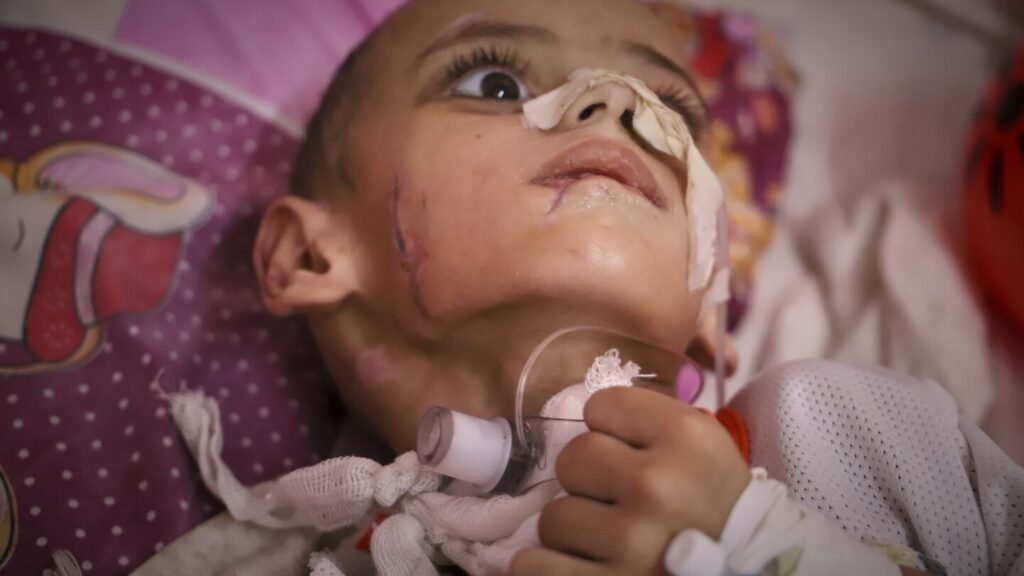BEIRUT (news agencies) — It’s as if the whole weight of Israel’s war in Gaza has fallen on Amr al-Hams. The 3-year-old has shrapnel in his brain from an Israeli strike on his family’s tent. His pregnant mother was killed. His father is paralyzed by grief over the death of his longtime sweetheart.
Now the boy is lying in a hospital bed, unable to speak, unable to move, losing weight, while doctors don’t have the supplies to treat his brain damage or help in his rehabilitation after a weekslong blockade and constant bombardment.
Recently out of intensive care, Amr’s frail body twists in visible pain. His wide eyes dart around the room. His aunt is convinced he’s looking for his mother. He can’t speak, but she believes he is trying to say “mom.”
“I am trying as much as I can. It is difficult,” said his aunt Nour al-Hams, his main caregiver, sitting next to him on the bed in Khan Younis’ Nasser Hospital in southern Gaza. “What he is living through is not easy.”
To reassure him, his aunt sometimes says his mother will be back soon. Other times, she tries to distract him, handing him a small ball.
The war began Oct. 7, 2023, when Hamas-led militants stormed into Israel and killed some 1,200 people, mostly civilians, and took 251 people captive. Israel’s retaliatory campaign has killed over 57,000 Palestinians, according to Gaza’s Health Ministry, which says women and children make up most of the dead but does not specify how many were fighters or civilians.
Nearly 21 months into the conflict that displaced the vast majority of Gaza’s 2.3 million people, it is nearly impossible for the critically wounded to get the care they need, doctors and aid workers say.
The health care sector has been decimated: Nearly half of the territory’s 36 hospitals have been put out of service. Daily bombings and strikes overwhelm the remaining facilities, which are operating only partially. They struggle with shortages of anything from fuel, gauze and sutures to respirators or scanners that have broken down and can’t be replaced.
Israeli forces have raided and besieged medical facilities, claiming Hamas militants have used them as command centers. Doctors have been killed or were displaced, unable to reach hospitals because of continued military operations.
For more than 2 1/2 months, Israel blocked all food, medicine and other supplies from entering Gaza, accusing Hamas of siphoning off aid to fund its military activities, though the U.N. said there was no systematic diversion. The population was pushed toward famine.
Since mid-May, Israel has allowed in a trickle of aid, including medical supplies.
Gaza’s Health Ministry estimates that 33,000 children have been injured during the war, including 5,000 requiring long-term rehabilitation and critical care. Over 1,000 children, like Amr, are suffering from brain or spinal injuries or amputated limbs.
“Gaza will be dealing with future generations of kids living with all sorts of disabilities, not just brain, but limb disabilities that are consequences of amputation that could have been prevented if the health system was not under the pressures it is under, wasn’t systematically targeted and destroyed as it was,” said Tanya Haj-Hassan, a pediatric intensive care specialist who has volunteered multiple times in Gaza with international medical organizations.
In April, one week before her due date, Amr’s mother, Inas, persuaded her husband to visit her parents in northern Gaza. They trekked from the tent they lived in on Gaza’s southern coast to the tent where her parents live.
They were having an evening meal when the strike hit. Amr’s mother and her unborn baby, his grandfather and his brother and sister were killed.
